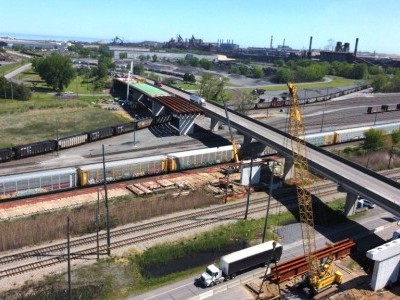Port of Oakland says canceled sailings could hit cargo volume
Apr 27, 2020Freight moving smoothly but 10 percent of vessel calls scrubbed in May, June
Fewer container ships would likely mean less cargo at the Port of Oakland this spring. That was the message Oakland Maritime officials delivered to the Harbor Trucking Association last week.
The Port told freight haulers via video conference that 20 May and June voyages to Oakland have been scrubbed. The result could be a 5-to-15 percent drop in containerized cargo volume heading into summer.
“It’s a clouded picture,” said Port of Oakland Business Development Manager Andrew Hwang. “About 10 percent of our scheduled vessel arrivals have been canceled by shipping lines, but we don’t know if that will translate into a similar drop in volume.”
The Port blamed vessel cancelations on the coronavirus pandemic which has stunted global trade. With consumer spending down, there’s less merchandise to load onto ships. That means fewer vessels needed between Asian manufacturing centers and U.S. ports. Import volume is expected to suffer the biggest cargo decline in coming months, the Port said.
Demand for Oakland exports remains strong, but voyage cancelations could place some markets beyond reach, the Port explained. Fruit, nut and meat exports are particularly coveted by overseas trading partners, especially in Asia, the Port said. It added that Oakland exports to South Korea increased 31 percent last month, and to Japan,18 percent.
The Port said cargo is moving smoothly through Oakland. There are no shortages of labor or equipment, it added.
The Port cautioned, however, that the coronavirus pandemic could permanently alter container transportation practices. Shipping lines may consolidate more cargo on bigger ships while reducing the frequency of voyages, the Port said.
Supply chains could be altered, too, the Port said. For example, the online purchasing explosion prompted by shelter-in-place orders may hasten distribution center reconfiguration or consolidation. Distribution hubs could be relocated to more central locations to serve population centers from fewer outlets.
“We’ll be facing a new normal,” said Mr. Hwang. “Distribution patterns will change…it won’t be like it was.
Similar Stories

Jeffersonville port delivers record road salt shipments to Greater Louisville area during recent winter storms
View ArticleNC Ports Notice: Holiday Schedule Notice Martin Luther King Jr. Day
The Port of Wilmington Container Gate (South Gate) and the Charlotte Inland Port (CIP) will operate on a reduced schedule on Monday, January 20: 8 AM-12 PM and 1 PM-5…
View Article
Port of Long Beach’s Cordero hails ‘Green Port’ achievements
View Article
Port of San Diego accepts $5 million grant from the San Diego County Air Pollution Control District for clean air project
View Article
Adriatic Gate Container Terminal welcomes Bora Med Service
View Article
Savannah gets India cargo to market up to eight days faster
View ArticleGet the most up-to-date trending news!
SubscribeIndustry updates and weekly newsletter direct to your inbox!





